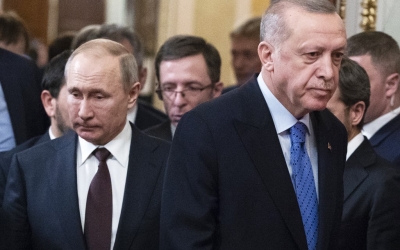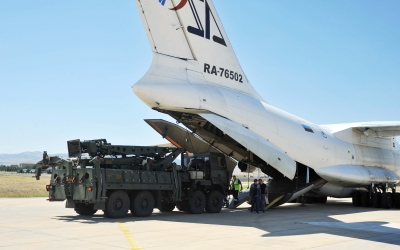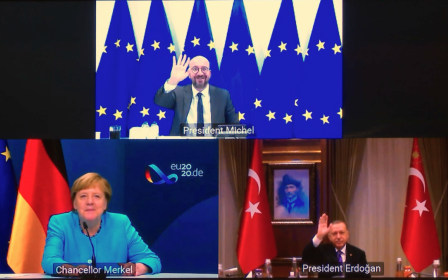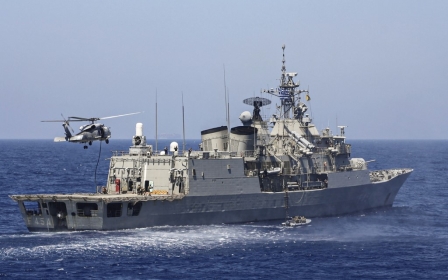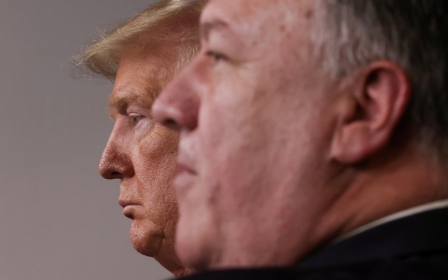For Turkey, Pompeo has discarded US impartiality in east Med dispute
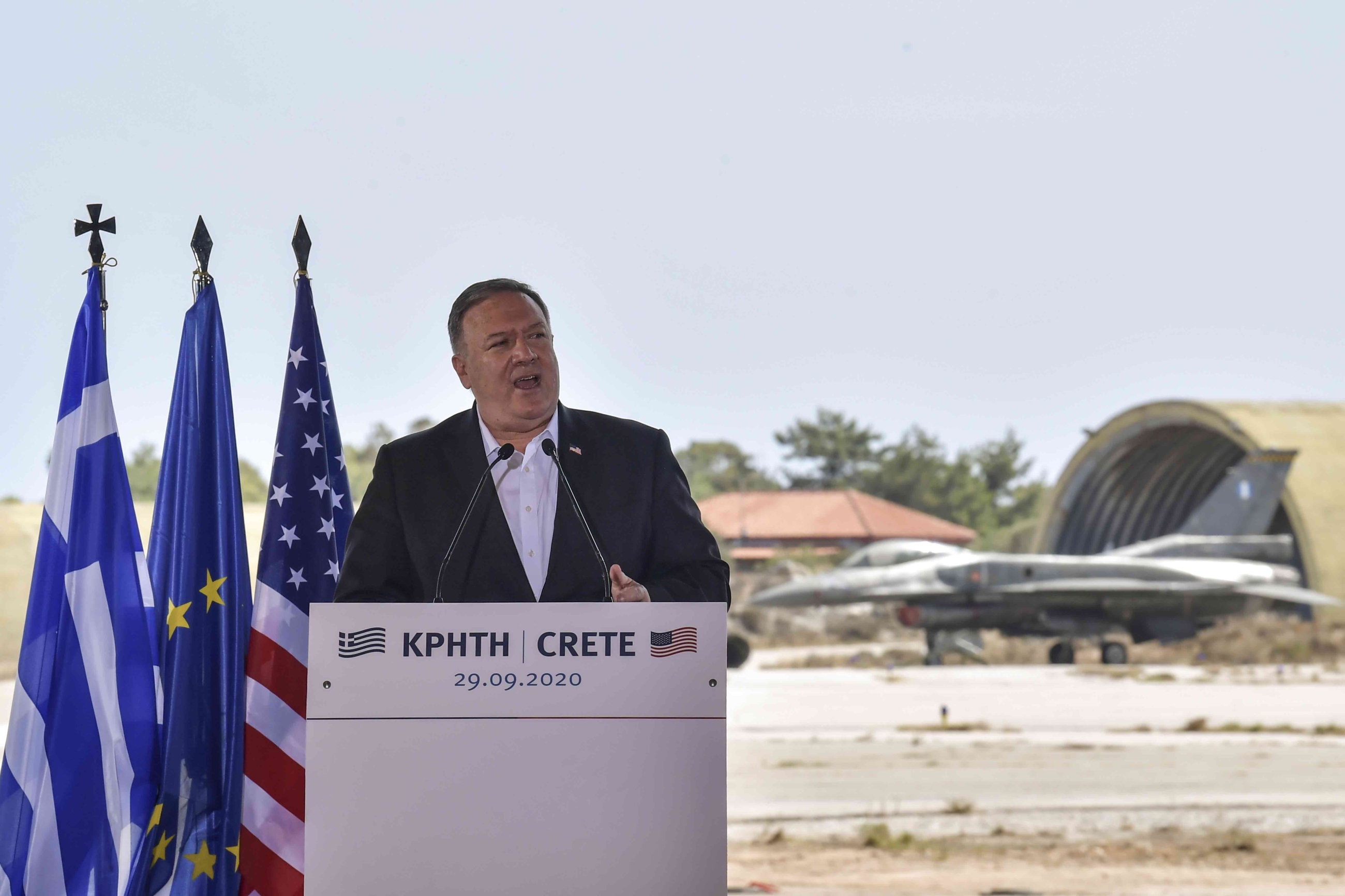
For weeks this summer, Turkey and Greece were left to their own devices, slinging mud over the media and charging warships into disputed waters of the eastern Mediterranean.
Eventually Germany intervened, but for Ankara the absence of a traditional power broker was palpable: Washington wasn’t there when it was needed. Worse, when it showed up, it had taken a side.
Turkish officials say the United States under its secretary of state, Mike Pompeo, has lost its “constructive neutrality” in the region, which Ankara once depended on to navigate the thorny question of divided Cyprus.
They had a point: since he assumed office, Pompeo has paid two separate visits to Greece, where he announced significant deepening of the bilateral relationship with more military deployments. The USS Hershel "Woody" Williams was dispatched to Souda Bay on Crete, the first expeditionary sea base vessel sent abroad by the US Navy in 40 years.
The State Department also removed an arms embargo against Cyprus on non-lethal defence goods. Though it was compelled to do so by a Congressional decision, the timing was noteworthy for Ankara.
“Pompeo had to visit Cyprus amidst a standoff between Turkey and Greece and make the announcement, right?” a Turkish official anonymously told Middle East Eye.
However experts like Aaron Stein, a longtime Turkey observer, disagrees. “The US wants to compete with Russia on the island," he tweeted last month. “[It] isn’t about Turkey... and yes I know that’s a hard sell.”
Regardless of the truth of the timing, Pompeo nonetheless raised eyebrows in Ankara by failing to abide by the long-standing precedent of meeting the leaders of the Turkish Cypriot community when he visited the island in September.
Turkish officials have also been concerned by the US support shown to Greece, Israel and Cyprus' trilateral mechanism to increase cooperation in March last year, when Pompeo made a personal appearance to back the initiative.
It made Turkish officials suspect that the countries were planning to create a united front to Turkey’s south with a view to challenging Ankara.
“What front?” an American official told MEE, speaking on condition of anonymity. “So you could flirt with the Russians by purchasing S-400s and we cannot back our own allies?”
Diplomatic silence
Pompeo’s alleged dislike of Turkey and its leaders is pretty famous. In 2016, immediately after a coup attempt in Turkey, he tweeted in his now deleted official account: “.@JZarif & #Iran govt about as democratic as that of @RT_Erdogan — both are totalitarian Islamist dictatorships.”
Except for an emergency trip with Vice President Mike Pence to stop a Turkish offensive in northern Syria against US-backed Kurds last year, Pompeo had never paid a bilateral visit to Ankara even though he had been in the region on many occasions.
And not even later, when confronting US rival Russia in Syria's Idlib on Turkey's side, did relations appear to warm.
“The diplomatic talks between Turkey and the US have been dead since the Russian offensive in Idlib last March,” a regional expert with direct knowledge said. “Except for some discussions on regional topics, there is nothing going on."
'Given the provision of S-400 missiles to Turkey, it is a logical consequence that strategic military planning is done with Greece rather than Turkey'
- Marc Pierini, analyst
Over the weekend the US finally dispatched Ambassador Philip T Reeker, responsible for European and Eurasian affairs at the State Department, to discuss the situation in the eastern Mediterranean and the Caucasus, where Azerbaijan and Armenian forces are facing off in Nagorno-Karabakh.
A second Turkish official said Reeker was only in Ankara to press Turkey to stop an Azerbaijani offensive to seize Nagorno-Karabakh, a disputed mountainous territory where violence has flared up intermittently over three decades.
“He just conveyed the same public message given by Washington, which was ‘work with us to reach a ceasefire and then the Minsk Group could intervene,’’’ the official said, referring to a collection of international mediators. “Obviously this time it won’t work, since they haven't made any progress in the last 30 years.”
There are others who believe that Russia is in fact the main motivation behind Pompeo’s recent steps.
“The intensified US-Greece contacts are related to the reinforced Russian presence in the Mediterranean,” said Marc Pierini, a visiting scholar at Carnegie Europe.
“Given the provision of S-400 missiles to Turkey, it is a logical consequence that strategic military planning is done with Greece rather than Turkey.”
Turkey purchased Russia's S-400 anti-missile system in a deal agreed in 2017 and delivered in 2019, although Turkey has yet to activate the system.
Turkish officials, on the other hand, claim that Pompeo’s moves are related to domestic considerations, such as upcoming presidential elections.
“Creating distance from Turkey is good for Greek and Evangelical votes," the first official said. “If Trump doesn’t win, he would have to run for the Senate in Kansas anyway.”
Middle East Eye propose une couverture et une analyse indépendantes et incomparables du Moyen-Orient, de l’Afrique du Nord et d’autres régions du monde. Pour en savoir plus sur la reprise de ce contenu et les frais qui s’appliquent, veuillez remplir ce formulaire [en anglais]. Pour en savoir plus sur MEE, cliquez ici [en anglais].


